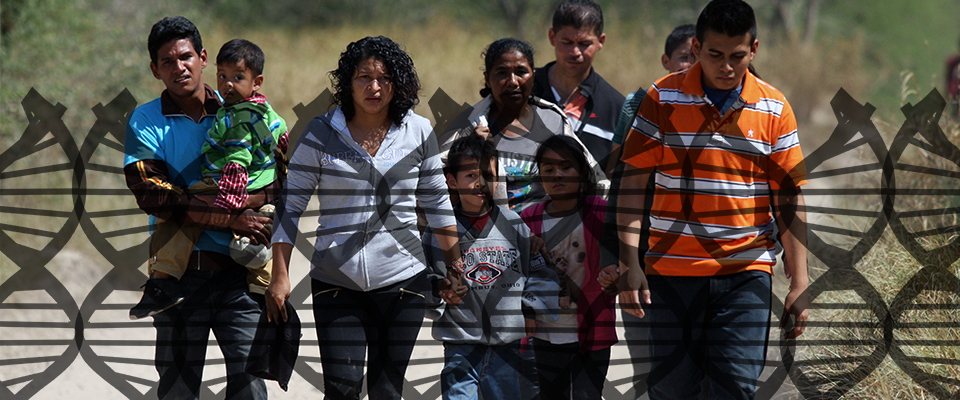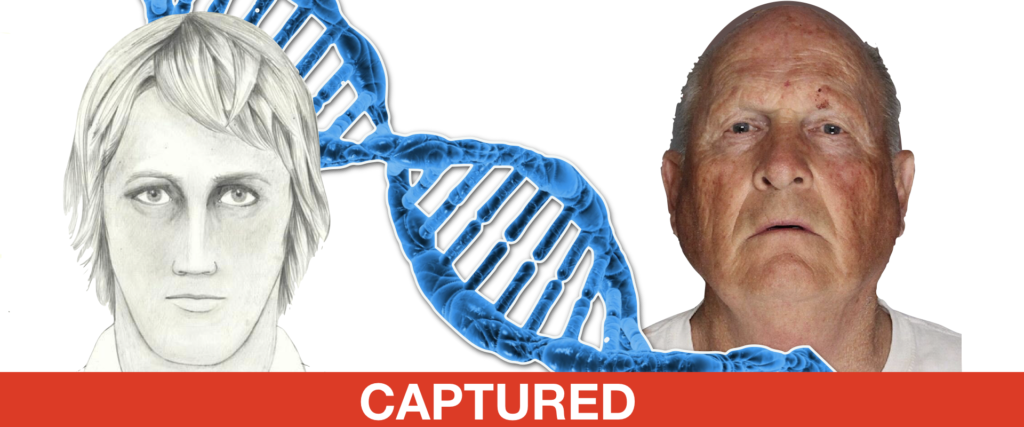In May 2019, the Department of Homeland Security (DHS) implemented a program called Rapid DNA testing—subjecting families crossing the Mexican border to cheek swab tests, which produce extensive DNA profiles in less than two hours that are entered into a national criminal database. The initial pilot program, begun this summer, was ostensibly rolled out to identify “fraudulent family units”—groups of children and adults who are not blood-related but were trying to achieve special immigration status—and prosecute them for fraud.
Immigration and Customs Enforcement isn’t authorized by Congress to conduct this testing. On November 12, the Electronic Frontier Foundation sued the DHS, and filed a Freedom of Information Act request (FOIA) to obtain more information about the Rapid DNA process, which they say is coercive: families at the border are forced to consent to having their swabs taken, or face separation or deportation. The lack of transparency about the implications of this program and the potential uses of the samples have raised concerns, including a statement from the Human Rights Watch citing privacy rights violations. Among other things, the FOIA is demanding the release of information like the accuracy rates of its DNA tests, the exact gene processing method being used, and the nature of the consent form that’s handed out to families.
Andrea Roth believes that this could set a precedent for other, more troubling surveillance efforts in the future. Roth, a professor of criminal law at Berkeley Law, specializes in the changing role of science in criminal prosecutions. She is the author of ‘Spit and Acquit’: Prosecutors as Surveillance Entrepreneurs, a study of the controversial Orange County practice of offering defendants charged with petty misdemeanors dismissals or plea deals in exchange for their DNA profile. We spoke with her about the undisclosed—and likely unprecedented—practices surrounding the collection of immigrants’ DNA, in anticipation of our upcoming issue on genetics (more about biotech and the use of DNA in criminal investigations coming soon). This conversation has been edited for length and clarity.
What do you think is the significance of this move by the DHS?
This is really the first time that we have mass forced DNA sampling that goes beyond people who are arrested for or convicted of crimes. That’s a big step, and could be a harbinger for a more universal database. So far, such databases have been justified by saying that we can use the fact of arrest or conviction to show some type of public safety concern. Or, as the Supreme Court in Maryland v. King said in 2013, the reason they take samples from arrestees is to help identify them, to make sure they are who they say they are.
In many people’s minds, including the dissenters in Maryland v. King—and also me—that reasoning doesn’t make any sense. It’s not the reason that we take DNA samples; we take them for safety reasons, and to try to solve crimes. But I could imagine the government using Maryland v. King to try to say, “We’re not taking DNA samples from people in DHS custody because we are trying to solve crimes; we’re only taking it as an additional measure of identification, because they’re in custody. It’s just part of the booking process, to make sure we know who we have. Just as if they’re being fingerprinted.” They are going to be able to use this bizarre logic of Maryland v. King to buttress their claim.
This is the type of issue that you could easily imagine an ideological divide on. Justice Gorsuch, for example, mentioned DNA in his dissenting opinion in Carpenter v. United States, about the government’s use of historical cell phone records without a warrant: His concern was that there are precedents justifying a government obtaining your DNA from 23andMe without a warrant, but that these precedents are worth questioning anyway. So it’s not obvious to me that the court would just sign off on something like [Rapid DNA testing], without any evidence of wrongdoing.
Your paper, ‘Spit and Acquit’, looks at the blurry line between surveillance and criminal justice, raising the question—is the reason, or justification, for this the need to prevent crimes rather than solve them?
The thing that’s special about “spit and acquit” that is also applicable here is that [the federal government is] claiming that the giving of the DNA sample is consensual, and is done in exchange for the particular kind of bargaining process. So they get to avoid the typical constitutional scrutiny that would be placed on people who are accused, say, of minor traffic incidents. Here, they can say, “You can apply for asylum—in exchange, we would like to ask for your DNA sample. You can say no, in which case we would be happy to transport you back to your country.” If they can somehow make this seem consensual, then they don’t even have to pass muster under the Fourth Amendment, which protects people from unreasonable searches and seizures, and which Maryland v. King was essentially about.
That’s the other big part of this—as immigrants go, so the rest of us go eventually as well. If it’s okay for [the government] to insist on a DNA sample in exchange for allowing [immigrants] to go through the asylum process, and if that’s somehow deemed consensual, then there’s really nothing stopping the government from forcing all of us to give a DNA sample to get any other type of discretionary benefit that we don’t have a constitutional right to. This could open up the floodgates to massive sampling.
You mean this could set a precedent for being able to collect and use DNA domestically?
Collect it from anyone, for anything. [We could have to] give a DNA sample in order to get our driver’s license.
What are the practical applications of how surveillance works, once you have built this expansive database? Is it to map out a whole population?
I’d be interested to know whether they had any internal regulations placed on this practice. Is there any chance these people will be expunged later, if, say, the person gets granted asylum status? Do they keep the physical sample? And where are they storing it, and who has access to it? Are they required to keep the DNA records and the samples confidential?
Offender databases are subject to all these regulations about what they’re allowed to be used for. You can’t just put any old sample in there for comparison—it has to be an unsolved crime, a sufficiently robust crime scene sample, things like that. If this [process] has none of those regulations, it’s a big deal. For example,[DHS] can just look at the person’s genetic history, including, say, their propensity for disease, if they want to.
But we’re assuming that these people have never set foot in the U.S. before.
Right, if these folks are being stopped at the border, presumably they haven’t yet committed a crime here because they’ve never been here. One possible justification for collecting the DNA of people who have never even been in the U.S. would be to use it as a deterrent: if they ever are released, they’re going to be less likely to commit a crime, because we would be able to determine that they were the perpetrator. So it’s for future crime solving.
The other justification they’d use is that they just want to know who they have here. There could be an illegitimate use of a group’s DNA—to try to keep tabs on them.
You mentioned that the full physical DNA sample would be traceable to things like disease. What does that mean? Would they now be able to know things like, say, how many people have an Alzheimer’s gene?
Yes! Who knows what they’re doing with these samples? If you have somebody’s whole DNA, a cheek swab, you can find out anything. To be Orwellian for a minute—the Trump administration could take DNA from immigrants with an eye towards trying to prove that Mexican people disproportionately carry a gene associated with “criminality.” Not that they’re doing that, but if somebody had a full DNA sample and wanted to try to engage in that sort of research, there would be nothing legally to stop them in the absence of regulation. I think that’s sort of the worst-case scenario—if it’s completely unregulated, and they’re taking it from a population that’s defined by their immigration status and not any association with a crime, I wonder what the purpose is and what else they might try to do with it.
That’s interesting because it is useful, especially with such a huge database, 40,000 people, to use broad strokes to paint a picture of a whole ethnic group.
Exactly. There’s nothing in place to stop them from doing that sort of research on existing offender databases. The regulations that currently exist for offender databases are there precisely to stop what I call “mission creep,” this sort of abusive use of DNA databases for non-law enforcement purposes, because the government can change its mind about what it will do with the information it has once the samples are in the database.
I’m curious what other parallels you see between this and Orange County, or other instances of privacy violations. These difference surveillance efforts seem to be targeting similarly marginalized groups.
The Orange County authorities won’t give me demographic information about who’s in the database. At first I was imagining that maybe there were a disproportionate number of white wealthy people in that database, because it includes people who’ve been arrested for DUIs and that kind of thing, but it is also the case that the vast majority of people who are arrested for driving on suspended licenses are people of color, and that also might include a lot of undocumented people. But in this situation, the practice is targeting a specific group of people…so this feels much more like China. China has created DNA databases for some of its ethnic minorities. I don’t want to say this is morally or legally equivalent to that, but it definitely feels much more like that than anything that’s come before it here in the U.S.
It’s placing people in a database solely based on their immigration status, and without any association with a crime, and that’s a big step. And not one that people should be happy about, if they care about civil liberties.
If the DHS is forced to hand over information in response to the FOIA request, what can/might American organizations legally do in response?
Depending on what the documents show if released, there might be evidence to suggest that the DNA tests are not reliable as a means of testing kinship, or that the purpose of the testing is not only to check for kinship to avoid fraud in asylum claims—their ostensible purpose—but also to try to solve crimes or deter future crimes. If that’s the purpose, and if they’re trying to rely on “consent” to justify what would otherwise be an unconstitutional seizure of DNA, then the consent forms might be helpful in showing either a lack of meaningful consent, or an “unconstitutional condition,” where the government is conditioning a benefit on the waiver of a constitutional right, under circumstances that are wrongfully coercive.





















